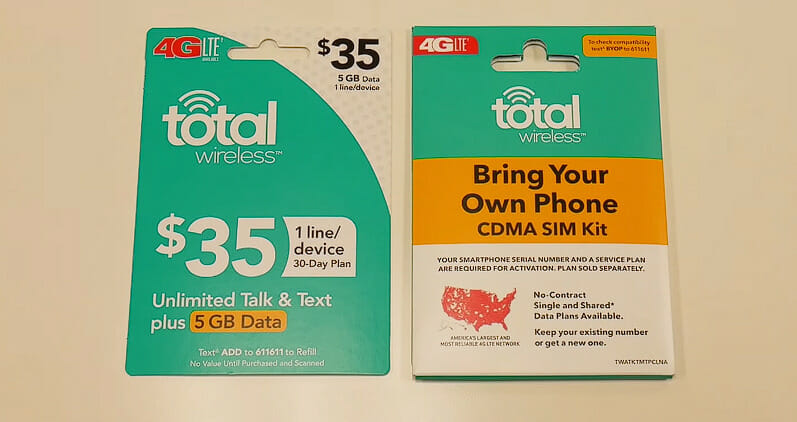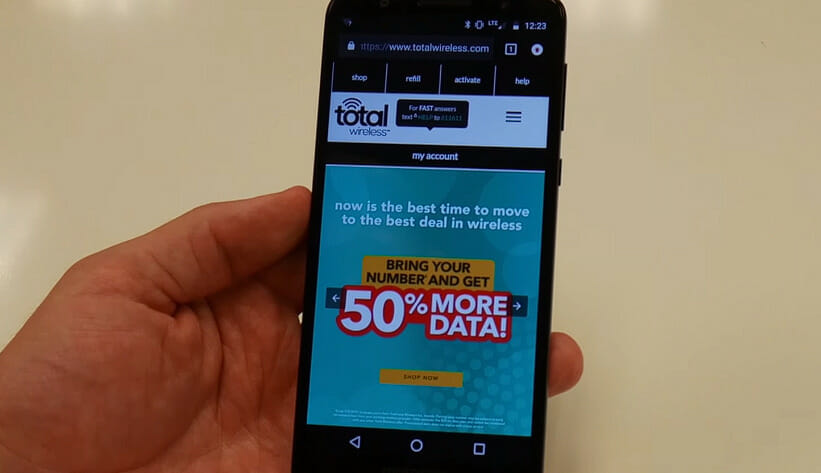Let me spill the beans immediately: Total Wireless is a Mobile Virtual Network Operator (MVNO) that operates on Verizon’s nationwide 4G LTE network. This arrangement allows Total Wireless to offer cheaper plans while benefiting from Verizon’s extensive coverage.
In this article, I’ll delve deeper into Total Wireless’s network operations, specifically its partnership with Verizon Network. Let’s go!
The Network of Total Wireless
Before we dive deeper, let me explain what it means for a wireless provider to run on another company’s network. Companies like Total Wireless are MVNOs or Mobile Virtual Network Operators in industry lingo.
They don’t own their network towers but rent space from a larger carrier.
And here’s the juicy bit: Total Wireless operates on Verizon’s nationwide network. Yep, you heard it right! When using Total Wireless, you’re tapping into Verizon’s extensive infrastructure. Pretty cool, huh?
I know what you’re thinking—if Total Wireless is on Verizon’s network, why not just go with Verizon? But hold up; it gets even better! They can offer lower prices because they rent space and do not maintain their infrastructure as major carriers do.
Hence, MVNOs usually offer much cheaper plans than their host networks. So with Total Wireless, you get great coverage and save some money!
To give you an idea of how many MVNOs rely on these big-name carriers’ infrastructure, allow me to introduce some numbers:
- Over 80 MVNOs are operating in the US today.
- Almost all of them use one or more of these four networks: AT&T, T-Mobile, Sprint, and, yup, you guessed it, Verizon.
Thus, even though your carrier might not have its personal physical infrastructure (like those towering cell towers), you still benefit from high-quality service thanks to these big-wig host networks.
Decoding the Network Infrastructure
Now let me share something interesting with you. Did you know there are four major networks in America? That’s Verizon, AT&T, T-Mobile, and Sprint. The rest of them usually rent space from these giants. This renting system, as mentioned, is called MVNO, or Mobile Virtual Network Operator.
Here’s how they stack up:
| Network | Coverage (%) |
|---|---|
| Verizon | 70 |
| AT&T | 68 |
| T-Mobile | 62 |
| Sprint | 30 |
These are approximations, but they give us a clear picture: Total Wireless users have access to one of the most extensive networks in the US thanks to its partnership with Verizon.
As such, Total Wireless’ performance on Verizon’s network is pretty awesome! You’ll get great coverage because Verizon has the largest network in the U.S.
But remember that your experience can vary based on where you live and other factors like building materials at your location.
Remember to do homework before switching carriers to ensure their service matches your needs and expectations!
How Does Total Wireless Fit In?
There’s more to consider beyond just coverage. We also need to look at the data speeds offered by Total Wireless. While we can’t chalk up every user’s experience since factors like location and device play significant roles here, many users report satisfactory data speeds with them.
Here are some average download speeds reported by users:
| Provider | Average Download Speed |
|---|---|
| Verizon | 25-30 Mbps |
| Total Wireless | 5-12 Mbps |
As you can see, while there might be some difference in speed compared to directly using Verizon services, Total Wireless offers decent performance for most users’ Internet needs.
Let me tell you something else about Total Wireless: their plans come without contracts. Love flexibility? You got it! With no binding contracts tying you down, you can switch plans or services whenever your heart desires!
Frequently Asked Questions (FAQs)
To assist you in better understanding Total Wireless and its network operations, here are some frequently asked questions:
Q1: Does Total Wireless use the same network as Verizon?
Yes, Total Wireless operates on Verizon’s network. However, it’s important to note that while Total Wireless users access Verizon’s network, their experience may vary due to network prioritization.
Q2: Can I use a Verizon phone with Total Wireless?
Generally, yes. Since Total Wireless uses Verizon’s network, most Verizon phones—especially those that are unlocked—should be compatible. However, it’s always a good idea to check with Total Wireless or use their online compatibility checker tool.
Q3: Since Total Wireless uses Verizon’s network, will I get the same coverage?
Total Wireless customers have access to Verizon’s network coverage. However, Total Wireless customers might not always have the same network priority as Verizon’s direct customers, especially during peak times or in crowded areas. This could potentially result in differences in service quality.
Q4: Will my data speeds be the same on Total Wireless as on Verizon?
While Total Wireless uses Verizon’s network, the data speeds may not always match. Total Wireless’s data speeds can be slower, particularly after you’ve used a certain amount of high-speed data. Your experience can also depend on network prioritization, especially during peak usage.
Q5: Can I use Total Wireless outside of the U.S., given that it uses Verizon’s network?
Total Wireless offers international calling services, but international roaming isn’t available. If you plan to travel abroad, you should check with Total Wireless about their services or consider an international SIM card or roaming package.
Q6: Are Verizon’s network features available to Total Wireless customers?
While Total Wireless customers have access to Verizon’s extensive network, not all of Verizon’s features and services may be available. For example, certain advanced calling features that Verizon provides to its direct customers may not be accessible to Total Wireless customers.
References
Organizations:
- GSMA. https://www.gsma.com/
- CTIA. https://www.ctia.org/
Websites:
- Total Wireless. https://www.totalbyverizon.com/
- PCMag. https://www.pcmag.com/
- CNET. https://www.cnet.com/
- MvnoDynamics. https://www.mvnodynamics.com/
Video References:
Clark Howard: Save More, Spend Less



